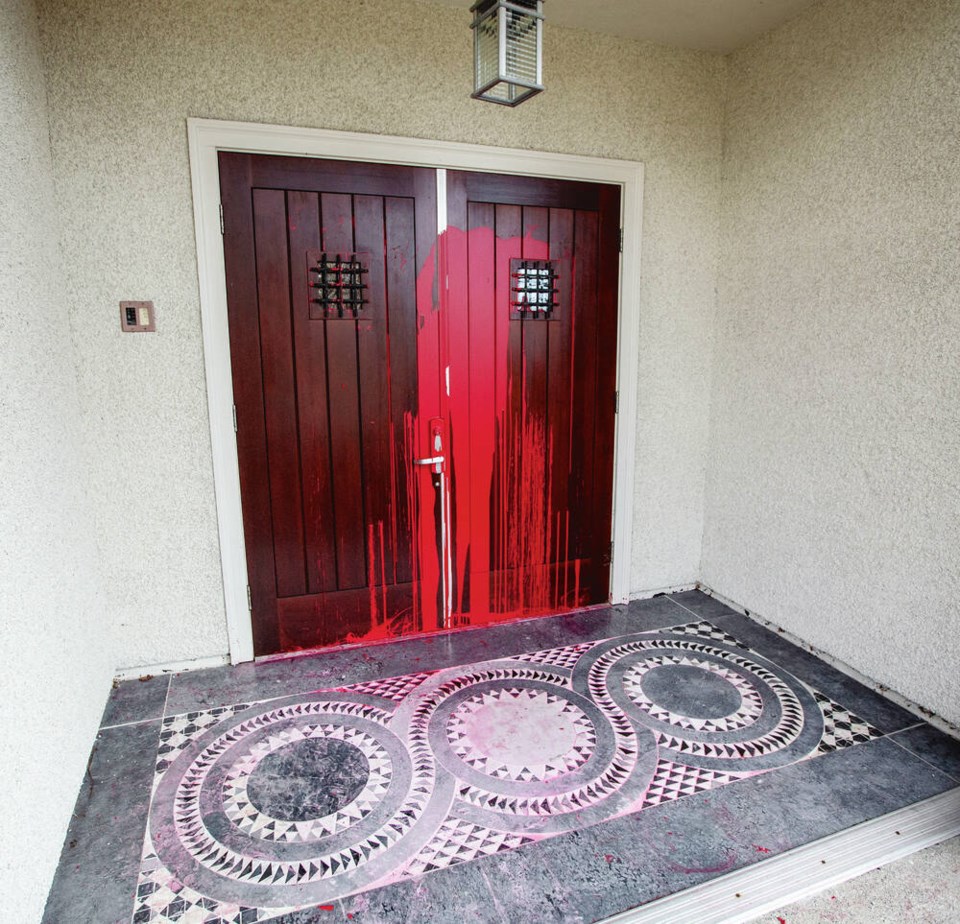Somebody just vandalized St. Sophia’s Orthodox Church in Fairfield, throwing red paint on the front doors.
The vandals probably thought they were striking a blow for Ukraine, given that the parish falls under the umbrella of the Russian Orthodox Church Outside of Russia.
A little bit of research would have shown how misguided the paint attack was, though. St. Sophia’s, an English-language church, includes both Ukrainians and Russians, as well as people of other backgrounds. One of the deacons is Ukrainian-born.
Besides, even if the church were Russian-only, that doesn’t mean attacking it would be like attacking Vladimir Putin. If you ask Russian-born Victorians about the invasion, they’re as likely to be as appalled as other Canadians are. More so, actually — it hits closer to home for them.
“It’s horrible,” says a woman named Margarita. “I, as a Russian, do not want that war. I want it to stop and Russian troops to go back home.”
Like some others, she’s a bit worried about being too public, as she visits Russia and is wary of testing the limits of a new law there that broadens the definition of treason.
Margarita only ventures this far in her criticism because she feels compelled to speak against a conflict that feels fratricidal. “There are lots of family ties between Ukraine and Russia. To me it looks like a civil war where cousins go against one another.”
Many in Victoria’s Ukrainian and Russian-speaking communities have lives that overlap, she says. “They do know each other quite well.” At pre-pandemic weekly get-togethers of Russian-speaking people, attendees were as likely to be Ukrainian or Armenian as they were to be Russian. Same goes for those participating in an online forum for Russian speakers.
Discussion on that forum has remained civil since the invasion, Margarita says. Still, she is reluctant to ask acquaintances how their families are doing in Ukraine. She doesn’t want to probe a sore point.
A Victoria Russian named Vladimir, who moved to Canada seven years ago, is still trying to wrap his head around how the invasion came about. “It’s still unbelievable. It’s a shock.”
He says he was never a fan of Putin, and opposes the invasion. “Our hearts go to those suffering in Ukraine, and friends in Russia who are in a very uncertain position.”
Others he knows feel the same way. “I’m certain that the vast majority of my friends in Russia are anti-war.”
Canadian friends of the financial manager ask him to explain what’s going on. “It’s quite unfortunate that Russian people do not have a lot of say in their own country,” he replies.
Does he squirm a bit being a Russian at a time like this? Good question. “I have no logical reason to feel awkward because it’s not my fault — but at the same time, I do feel bad,” he says. Call it guilt by association.
He was relieved to hear of Ukrainian-Canadians in Victoria saying their fight is with Vladimir Putin, not the Russian people. “Naturally, there is this thought of ‘What do they think about us?’ ”
Another Russian-born Victorian, Ilya Usachev, who moved here in 2017, is unequivocal in his assessment of the war. “It’s a terrible tragedy,” he says. “Putin is a madman.”
Last Sunday, he joined a crowd of demonstrators waving Ukrainian flags on the lawn of the legislature.
Of his circle back in Russia, maybe half don’t fully comprehend what is going on in Ukraine, he says. He has family members who don’t believe Kyiv is under attack. They think the only targets are fascists. “It breaks my heart.”
At the same time, his Canadian friends don’t have a firm grasp on the story, either. Or, at least, they don’t feel it at a personal level, like those who know people who are affected.
Usachev has a classmate who married a Ukrainian. The couple and their two young children fled Kyiv and are now hiding in a cabin far from the capital. Usachev would like to help bring them to Canada, but doesn’t know how.
That’s what real life looks like. Throwing paint at a church in Fairfield won’t help.



